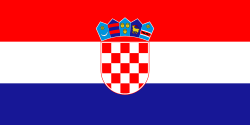 | |||
| Nickname | Lavice (The Lionesses) | ||
|---|---|---|---|
| Association | Croatian Football Federation (HNS) | ||
| Confederation | UEFA (Europe) | ||
| Head coach | Nenad Gračan | ||
| Captain | Doris Bačić | ||
| Most caps | Kristina Nevrkla (107) | ||
| Top scorer | Ivana Rudelić (22) | ||
| FIFA code | CRO | ||
| |||
| FIFA ranking | |||
| Current | 61 | ||
| Highest | 44 (July 2003 – June 2005) | ||
| Lowest | 65 (November 2010; July 2011) | ||
| First international | |||
(Ižakovci, Slovenia; 28 October 1993) | |||
| Biggest win | |||
(Kecskemét, Hungary; 27 May 2001) | |||
| Biggest defeat | |||
(Bucharest, Romania; 2 October 2004) | |||
| Website | hns-cff.hr | ||
The Croatia women's national football team represents Croatia in international women's football matches. It is governed by the Croatian Football Federation, the governing body for football in Croatia. It is a member of UEFA in Europe and FIFA in global competitions. The team's colours reference two national symbols: the Croatian checkerboard and the country's tricolour. They are colloquially referred to as the Lavice ('Lionesses'). So far, the Lavice have not qualified for any major tournament.

